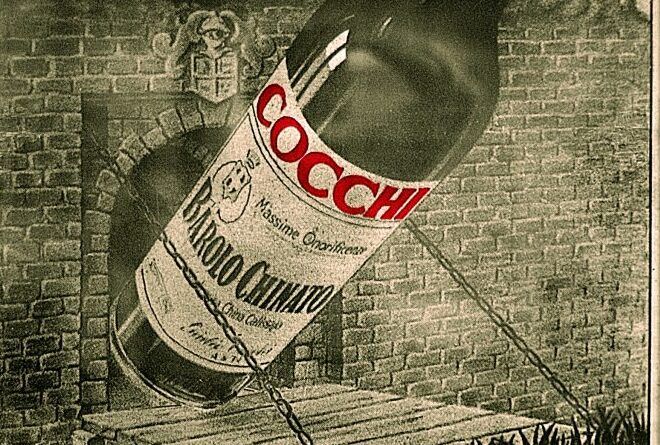“The Cocchi Barolo Chinato tipo Esportazione 130th Anniversary was originally developed in the nineteenth century for export markets, with a slightly higher ABV and a special blend of herbs and spices to withstand long journeys by sea in wooden barrels,” writes Smart.
The last invite to Above at Hide, the private dining room at the Mayfair restaurant, came 18 months ago for a tasting of Italy’s premium sparkling wine. Within a few days lockdown had descended and the lights literally went out in London eateries. It felt a small miracle, then, to be back at the Michelin-starred restaurant to savour wine and food and conviviality once again. Our hosts were again stylish Italians, this time Roberto and Giorgio Bava, father and son proprietors of Italian vermouth and aperitifs maker Cocchi.
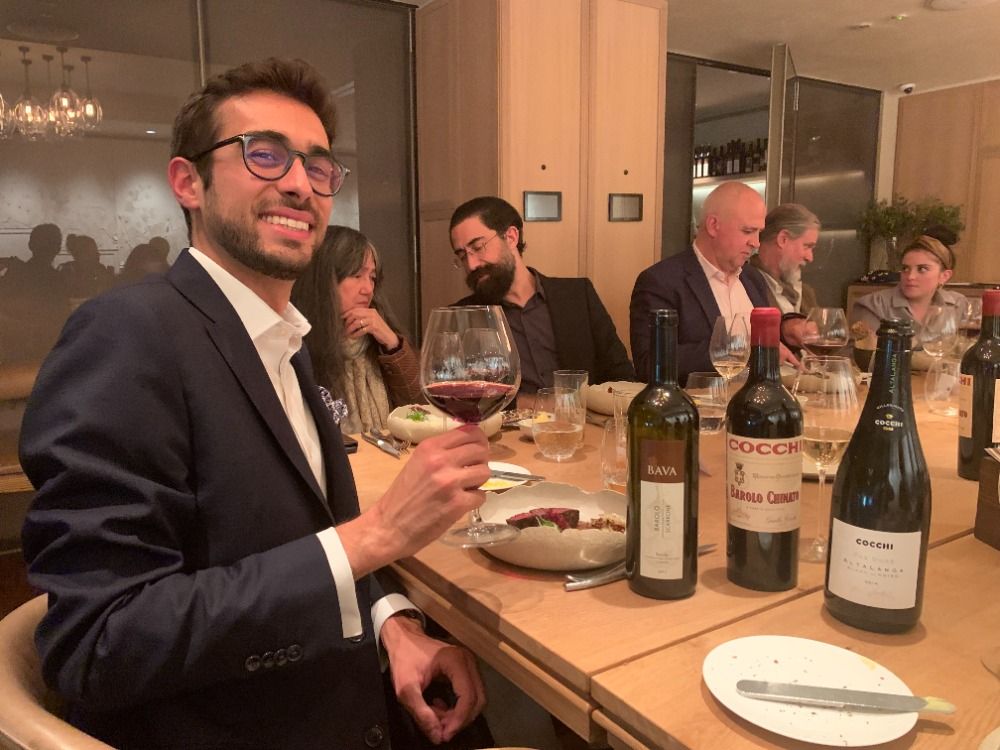
Giorgio Bava, launch of Cocchi Barolo Chinato tipo Esportazione, Hide, London, October 2021
Pronounced “cock/ee” (or even at a pinch “cocky”) in lazy English, the brand needs no introduction for bartenders worldwide. Cocchi’s Storico Vermouth di Torino (16% ABV) is a staple ingredient in classic cocktails such as the Negroni, Manhattan and Americano. And quinine-flavoured Cocchi Americano has become a vital ingredient in the Vesper cocktail, created for 007 by author and inspired amateur mixologist Ian Fleming.
Hide’s barman Oskar Kinberg had been busy dreaming up cocktail recipes ahead of our dinner. First comes Torino’s Violet (Cocchi Storico Vermouth di Torino, rye whiskey, violet and soda). This is about as refreshing as a cocktail gets – high summer in a glass. Then we have Mediterranean Nights (Cocchi Dopo Teatro Vermouth, gin, and extra virgin olive oil). Another winner. Far from standing out, the olive oil insinuates itself effortlessly.
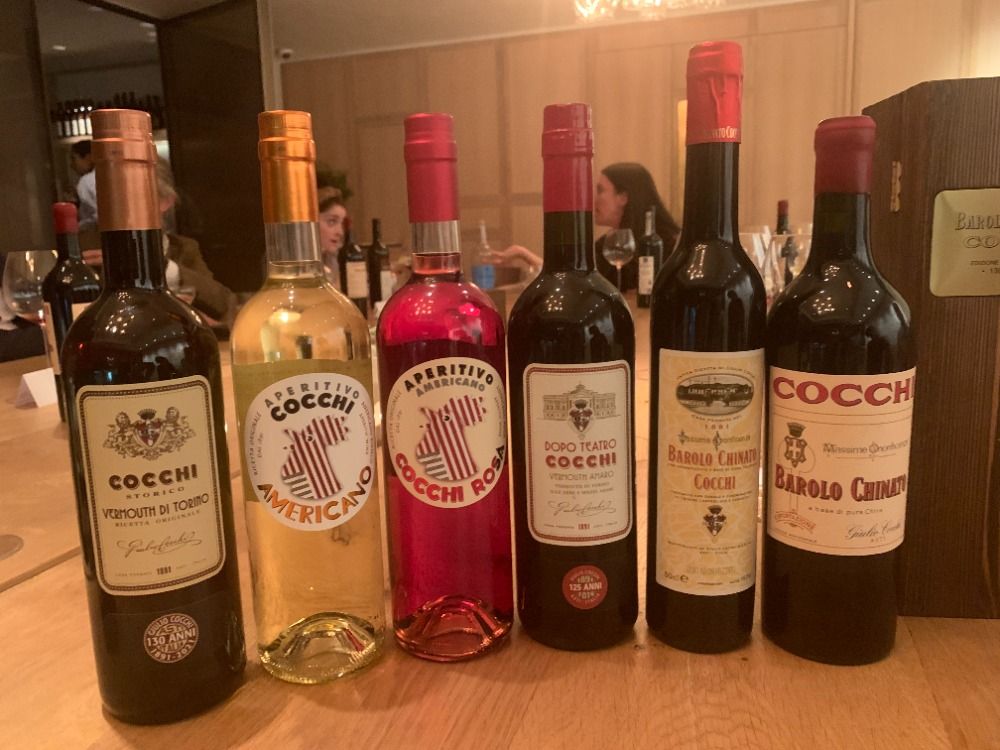
Roberto and Giorgio apparently felt an excuse for a post-lockdown celebration was required. They hit upon the 130th anniversary of Cocchi founded in the Piedmont town of Asti by Giulio Cocchi in 1891. Though famous for its vermouths and digestifs, the firm actually has an array of wine products. Next in store for us is Alta Langa Pas Dosé 2014 sparkling wine. Though not cheap at around €60 a bottle, this blanc de noirs (12 % ABV) is a fizz with the most extraordinarily fine bubbles to tease the palate. Giorgio has to break the news to me rather gently that they have no plans to sell this joyous stuff here.
Meanwhile, the food mounts its own onslaught on our senses. Chef Ollie Dabbous has conjured red bream with grapefruit and shiso blossom into a visual feast. Then comes glazed Wagyu beef, violet mustard, black truffle and sparassis. The courses are said to be ‘finger food” – if so, it’s certainly the most lavish I’ve ever experienced.
The conviviality index is spiking as we head for the pud – and the big reveal. We are served a warm, chocolate “acorn” cake with smoked caramel and liqueur. That sets us all chattering – it can’t be real acorns, surely?
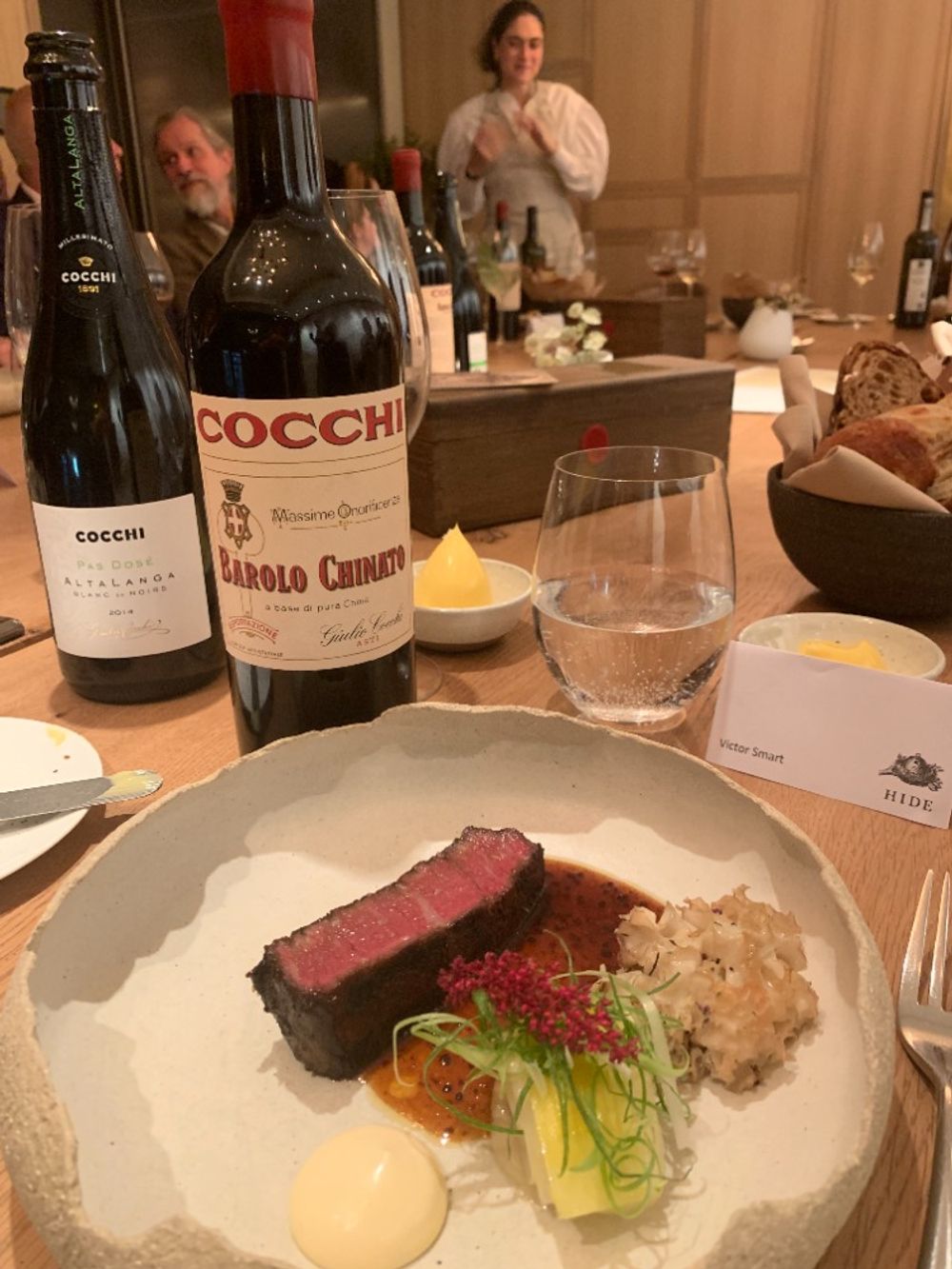
The bottle design is a recreation of the original Barolo Chinato
Cocchi Barolo Chinato tipo Esportazione
To accompany this is the reason we are gathered here: the unveiling of the Cocchi Barolo Chinato tipo Esportazione 130th Anniversary. This was originally developed in the nineteenth century for export markets, with a slightly higher ABV and a special blend of herbs and spices to withstand long journeys by sea in wooden barrels. It is single vineyard, single cask, and single vintage.
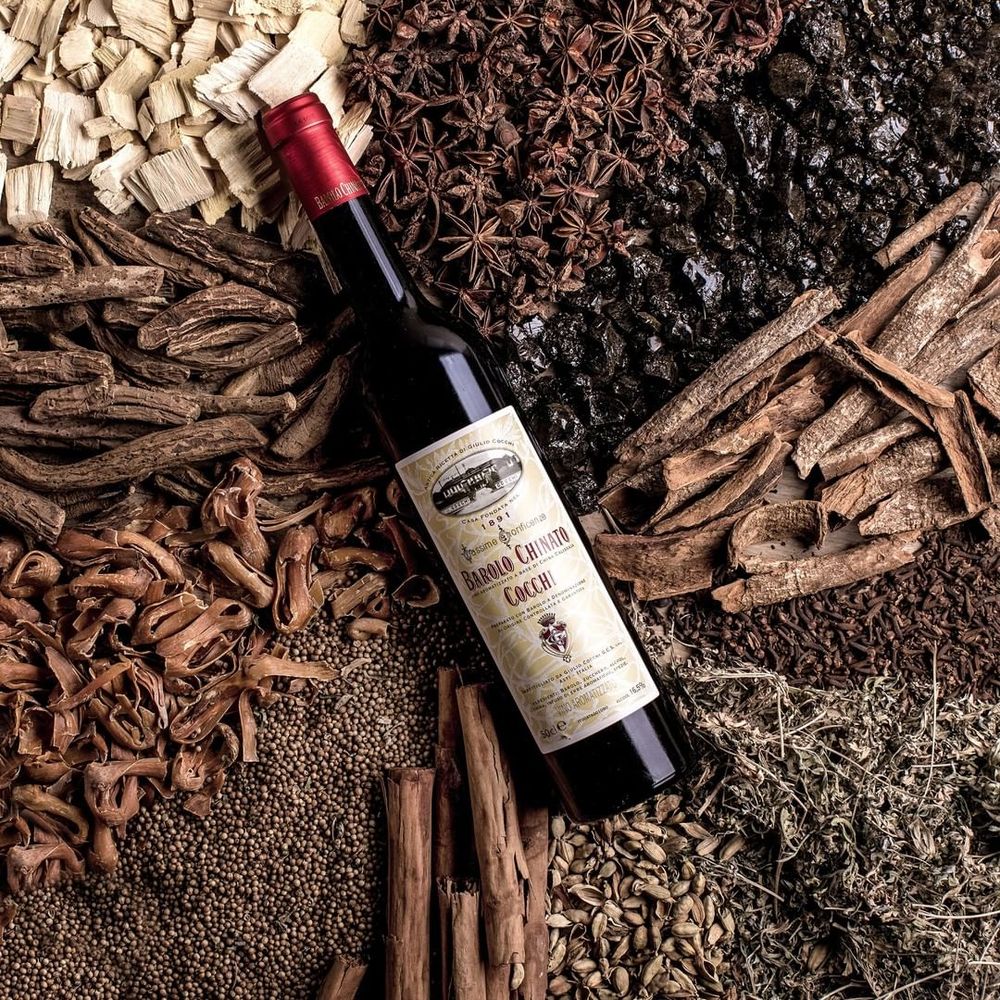
The ‘standard’ Barolo Chinato with its botanicals
Chinato means “quininified” and the Barolo Chinato is a top-drawer Barolo, fortified and infused with the bark of the quinine tree, and a host of other ingredients such as rhubarb root, gentian and cardamom seeds. The base wine is in fact a Barolo DOCG single cru made from the Bava family’s estate from a 2016 vintage.
The Chinato is billed as unbeatable with dark chocolate and it’s true, the bitter concoction cuts through the sweetness of the dessert brilliantly.
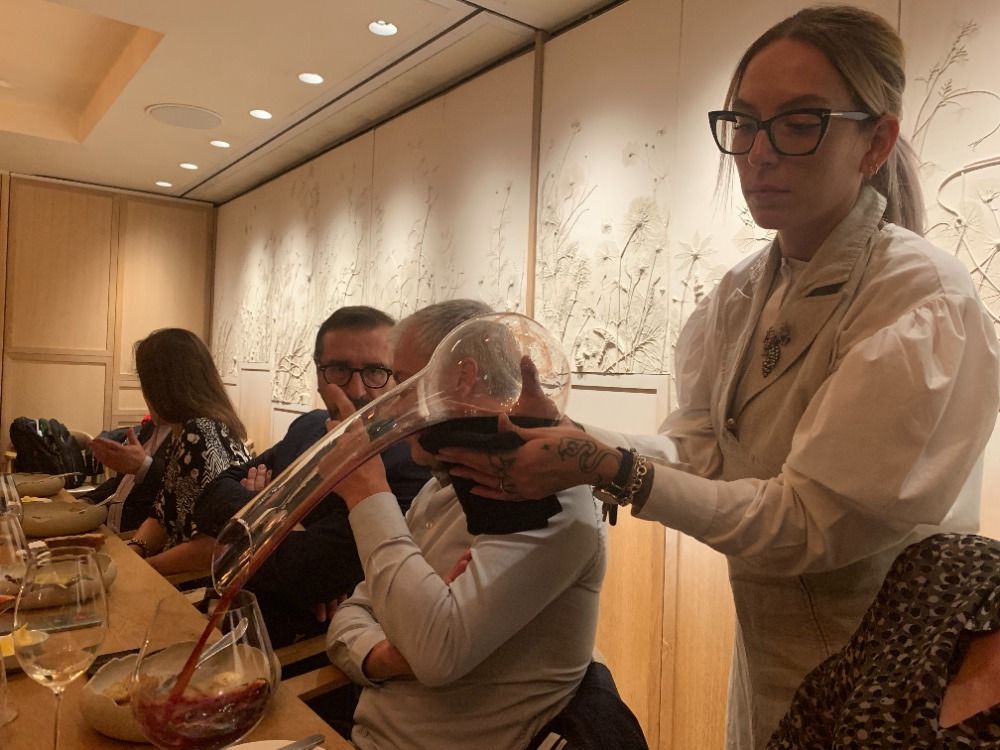
The pouring of the new Cocchi Barolo Chinato tipo Esportazione; Roberto Bava in background
Like all Chinatos, I suspect, the special Esportazione is best enjoyed neat. On the nose there are rich, woody notes of cinchona bark, dry tobacco leaves and spices, followed by flavours more typical of the Barolo wine. On the palate there’s dark berries, violets and velvety tannins together with cardamon, liquorice and orange peel.
On presentation, nothing has been left to chance. The bottle is adorned by a reproduction of the original 1900s hand-drawn label and arrives is a sealed wooden box. Though unarguably a wine product, the Chinato is also calculated to appeal to the discerning spirits drinker.
It was Giulio Cocchi who formulated the original recipes for Barolo Chinato, Aperitivo Americano and other different types of vermouth that have been in production for over a century. The Bava family, who took over in 1978, have remained true to the use of traditional techniques and natural ingredients in pursuit to making a “cult” brand of Cocchi.
Roberto declares: “We found in our archives a unique recipe which we brought back to life in a limited edition to mark the anniversary.” There will only be 1,200 bottles. Still it has already done a fair bit to bring us all back to life.
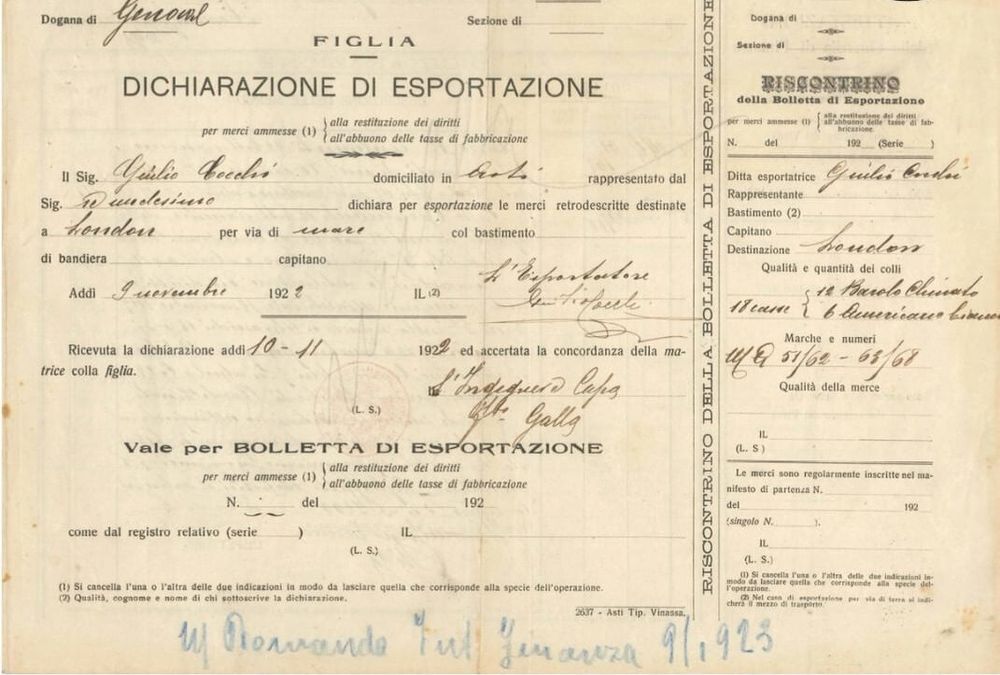
Exports have always been key for Cocchi: a shipping document from 1922 showing a London order for 12 cases of Barolo Chinato and 6 cases of Americano Bianco.
Barolo Chinato tipo Esportazione, 18% ABV, 75cl available at The Whisky Exchange – RRP: £115
Cocchi is imported and sold in the UK by Speciality Brands which is a supplier partner of The Buyer. To discover more about them click here.
